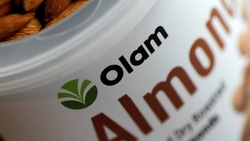
An Olam International plant in Vietnam used Australian almonds instead of American almonds after the U.S.-China trade war ensued. (Photo: Reuters)
Singapore's Olam taps Vietnam for farm product exports to Asia
by TAKASHI NAKANO, Nikkei staff writer
Singapore-based agricultural trader Olam International has positioned Vietnam as an export center for Asia, including China, amid uncertainty springing from the trade friction between Washington and Beijing. The strategy is symbolized by a massive pepper plantation in central Vietnam the size of roughly 150 baseball stadiums.
Located two hours by automobile from Pleiku, a city in Gia Lai Province, the plot of land was acquired in 2016. There, Olam cultivates disease-resistant pepper varieties in specialized facilities where the heat, humidity and water levels are automatically monitored.
The group plans to reap the first harvest as soon as next year, and produce 2,000 tons a year by around 2024. The crop will be transported to a processing facility in Dong Nai Province further south, and the final products will be shipped to leading consuming markets around the world.
Vietnam accounts for about 40% of global pepper production, and roughly 60% of trade in the commodity. The country's climate and soil properties are well suited for pepper cultivation, and the government has championed the farm produce as a strategic export.
Olam started trading in peppers in Vietnam in 2004, expanding to cleaning and sterilization in 2008 and taking on grinding the product two years later.
By May of next year, Olam will start up a pepper processing plant that will double capacity. The trader ensures a steady supply of raw material by running its own pepper plantation.
Peppers grown at Olam's farm in Vietnam's Gia Lai Province will be ready for harvest next year. (Photo by Takashi Nakano)
Olam, which does business in 67 nations worldwide, chose Vietnam to house the largest base of its Asian operations due to the country's highly educated workforce. Because hires are able to quickly develop technical capabilities, the company expects to attain elevated productivity.
Vietnam is able to produce 3.5 to 5 tons of pepper per hectare annually, according to Olam's research, far exceeding India and Indonesia, where crop performance hovers between 0.5 and 1.5 tons per hectare.
Production rates of coffee and other farm products in Vietnam also outpace yields in other countries.
Farmers abroad are only interested in domestic market prices, said Amit Verma, Olam's country head for Vietnam. Domestic farmers, however, strive to know the outlooks of international markets, even asking about futures in the London market. Cashew processing facilities are blessed with highly dexterous workers that sort nuts, Verma added.
Because Vietnam is part of the Association of Southeast Asian Nations, almost all farm products can be exported to other members tariff-free. That facet drew Swiss food giant Nestle to the country, where it started an instant coffee plant in summer of last year.
Charoen Pokphand Foods, the crown jewel of Thailand's largest conglomerate Charoen Pokphand Group, will expand its Vietnamese chicken-processing facilities. CP Foods will transform what is a domestic-focused operation into an exporting enterprise.
In 2017, Olam began operating an almond processing plant in Dong Nai Province. The facility took in fresh almonds shipped from Olam's farms in the U.S., and delivered the final product to China. But the trade war resulted in stiff retaliatory tariffs against America-derived almonds, so the company shifted to its Australian farms as the supply source.
Vietnamese workers sort cashews at Olam's plant in Dong Nai Province. (Photo by Takashi Nakano)
Olam taps its vast network of global production and export hubs to flexibly adapt to changing market conditions. In Vietnam alone, the trader has 22 cultivation and processing centers. Employees in the country number roughly 5,000 people, and the head count is set to grow 30% by 2021.
The company aims to expand highly profitable operations, such as producing custom spices for client food manufacturers.
Because Vietnamese consumers are gaining purchasing power in step with economic growth, Olam is lifting the ratio of products shipped within the borders. Its domestic share will rise to between 15% and 20% in five or six years from roughly 10% currently, said Prakash Jhanwer, Olam's president and regional head of Southeast Asia and China.
While Olam is actively investing, earnings have been uneven lately. The company took in 15.9 billion Singapore dollars ($11.7 billion) in sales during the first half of the year, up 16.2% from a year earlier. But net profit shrank 8.5% to about SG$230 million. The return on equity wallows at 5.3%, far removed from the 12% goal set in the medium-term plan.
To improve finances, Olam has decided to withdraw from rubber, wood products, fertilizer and sugar operations. The company will concentrate resources primarily on spices and edible nuts. In Vietnam, its lumber business is on the chopping block.
On the sustainability front, Olam is coaching Vietnamese farmers free of charge on how to cultivate high quality peppers at low cost. Farmers in the program are not obligated to sell the company their harvests.
"In the past, we suffered mass deforestation because of herbicides; now crop yields have become stable," said a participating farmer.













